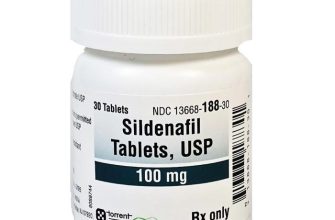Take Viagra exactly as prescribed by your doctor. The typical starting dose is 50 mg, taken as needed, about one hour before sexual activity. Adjustments may be made depending on your individual response and any potential side effects.
Swallow the tablet whole with a glass of water. Do not crush, chew, or break the tablet. Alcohol consumption may reduce the effectiveness of Viagra, so moderation is advised. The medication works best on an empty stomach, although this isn’t always required.
Important: Viagra is intended for use only by men with erectile dysfunction. It’s crucial to discuss any pre-existing health conditions, particularly heart problems or liver/kidney issues, with your physician before starting treatment. Never exceed the recommended dose.
Common side effects include headaches, flushing, nasal congestion, and visual disturbances. These are usually mild and temporary. However, seek immediate medical attention if you experience a sudden loss of vision or hearing, chest pain, or prolonged erection (priapism). Your doctor can provide a detailed list of potential side effects and discuss management strategies.
Remember to store Viagra in a cool, dry place, away from direct sunlight and moisture, to maintain its efficacy. Always keep the medication out of reach of children.
- Directions for Viagra
- Dosage Adjustments
- Important Considerations
- Understanding Viagra Dosage
- When and How to Take Viagra
- Potential Side Effects of Viagra
- Viagra and Alcohol Interaction
- Understanding the Risks
- Recommended Approach
- Alcohol Consumption and Viagra Dosage
- When to Seek Medical Attention
- Viagra and Other Medications
- Storage and Disposal of Viagra
Directions for Viagra
Take Viagra exactly as prescribed by your doctor. The usual dose is 50 mg, taken as needed, about one hour before sexual activity. Do not take more than one tablet in a 24-hour period.
Dosage Adjustments
Your doctor may adjust your dose based on your response and any health conditions. Possible doses range from 25 mg to 100 mg. Always follow their specific instructions. If you experience side effects, contact your doctor immediately.
Viagra should be taken with a glass of water. Food may slightly delay absorption, but it doesn’t significantly affect effectiveness. Avoid grapefruit and grapefruit juice, as they can interact with Viagra. Alcohol consumption can also affect its efficacy and increase the risk of side effects.
Important Considerations
This medication isn’t suitable for everyone. Inform your doctor about any heart problems, high or low blood pressure, liver or kidney disease, eye problems, bleeding disorders, or if you are taking other medications, especially nitrates. These factors influence the safety and appropriateness of Viagra.
Common side effects include headache, flushing, stuffy nose, and upset stomach. More serious side effects are rare but require immediate medical attention. Seek emergency care if you experience chest pain, sudden vision changes, or prolonged erection (priapism).
Understanding Viagra Dosage
Start with the lowest dose, 25mg, unless your doctor instructs otherwise. This allows your body to adjust and minimizes potential side effects.
The typical dose is 50mg. Your doctor might prescribe this as a starting point, or you might progress to it after starting with 25mg.
A higher dose of 100mg may be used, but only if needed and prescribed by your doctor. It’s not generally recommended as a first choice.
Never increase your dosage without consulting your physician. Adjustments should be based on individual responses and potential side effects.
Viagra should be taken only as directed by your doctor. Following the recommended dosage helps ensure safety and effectiveness.
Timing matters. Take Viagra about an hour before sexual activity. The effects usually last for four hours.
Consider factors like age, overall health, and other medications you are taking. Your doctor will assess these factors when determining the appropriate dosage.
If you experience side effects, such as headaches or flushing, talk to your doctor. They may adjust your dose or recommend alternative treatment.
When and How to Take Viagra
Take Viagra about 30-60 minutes before sexual activity. This allows sufficient time for the medication to take effect.
Follow your doctor’s prescribed dosage carefully. Do not exceed the recommended dose.
- Dosage Considerations: The typical starting dose is 50mg. Your doctor may adjust this based on your individual needs and response to the medication.
- Frequency: Viagra is typically taken only as needed, not daily.
- Maximum Dosage: The maximum recommended dose is usually 100mg per day. Never exceed this amount without consulting your physician.
Viagra works best on an empty stomach or with a light meal. Heavy, fatty meals can delay absorption.
Alcohol can reduce the effectiveness of Viagra and increase the risk of side effects. Limit alcohol consumption before and during Viagra use.
Remember to drink plenty of water throughout the day, especially if you experience any side effects like headaches or flushing.
- Important Note: Consult your doctor before taking Viagra, particularly if you have underlying health conditions, such as heart problems or high blood pressure.
- Medication Interactions: Inform your doctor of all medications you are currently taking, including over-the-counter drugs and supplements, as some medications may interact with Viagra.
- Side Effects: Common side effects can include headache, flushing, stuffy nose, and visual disturbances. If you experience severe or persistent side effects, contact your doctor immediately.
Always store Viagra in a cool, dry place, away from direct sunlight and moisture.
Potential Side Effects of Viagra
Viagra, while effective for many, can cause side effects. These vary in severity and frequency. Common side effects include headaches, facial flushing, nasal congestion, and upset stomach. These usually are mild and temporary.
More serious, though less common, side effects require immediate medical attention. These include chest pain, irregular heartbeat, sudden vision loss, or prolonged erection (priapism). Seek medical help if you experience any of these.
Visual disturbances, such as blurred vision or changes in color perception, are possible. If you notice significant changes in your vision, contact your doctor immediately.
Hearing problems, including ringing in the ears (tinnitus) or sudden hearing loss, are also reported, although rarely. Report any hearing changes to your healthcare provider without delay.
Viagra can interact with other medications, so always inform your doctor about all your current medications, including over-the-counter drugs and supplements. This helps prevent potentially harmful interactions.
Remember, this information is not exhaustive. Consult your doctor or pharmacist for a complete list of possible side effects and to discuss any concerns you may have.
Viagra and Alcohol Interaction
Avoid combining Viagra (sildenafil) with alcohol. Alcohol can intensify Viagra’s side effects, particularly hypotension (low blood pressure) and dizziness. This combination increases your risk of experiencing unpleasant symptoms.
Understanding the Risks
While a small amount of alcohol might not cause significant problems for everyone, consuming alcohol with Viagra significantly increases the risk of experiencing side effects like headaches, flushing, and nasal congestion. More serious side effects, including fainting and heart problems, become more probable with increased alcohol consumption.
Recommended Approach
For safe use, abstain from alcohol completely on days you take Viagra. If you have pre-existing heart conditions or high blood pressure, this precaution is especially critical. Even moderate alcohol consumption can interact negatively with the medication.
Alcohol Consumption and Viagra Dosage
| Alcohol Consumption | Viagra Dosage Recommendation |
|---|---|
| None | Follow prescribed dosage. |
| Moderate (1-2 drinks) | Consult your doctor; potential risk increase. |
| Heavy (3+ drinks) | Strictly avoid Viagra; significantly increased risk of adverse effects. |
When to Seek Medical Attention
If you experience chest pain, prolonged erection (priapism), sudden vision changes, or severe dizziness after consuming alcohol and taking Viagra, seek immediate medical attention. These could indicate serious complications requiring urgent treatment.
Viagra and Other Medications
Always inform your doctor about all medications you’re taking, including over-the-counter drugs, supplements, and herbal remedies, before starting Viagra. This includes nitrates, which can cause a dangerous drop in blood pressure when combined with Viagra. Alpha-blockers, often prescribed for high blood pressure or prostate problems, can also interact, potentially leading to low blood pressure.
Certain antifungal medications, such as ketoconazole and itraconazole, can increase Viagra’s levels in your blood, potentially raising the risk of side effects. Similarly, protease inhibitors, used to treat HIV, can have a similar effect.
Avoid grapefruit juice while taking Viagra, as it can interfere with the medication’s metabolism and increase its concentration in your bloodstream.
Your doctor can assess potential drug interactions and adjust dosages or recommend alternatives if necessary. Open communication with your healthcare provider is key to safe and effective medication management. Never self-medicate or alter your prescribed dosage without consulting your doctor.
Storage and Disposal of Viagra
Store Viagra tablets at room temperature, between 68°F and 77°F (20°C and 25°C). Protect them from moisture and direct sunlight. Avoid extreme temperatures and humidity.
Keep Viagra out of reach of children and pets. A locked medicine cabinet is recommended.
Discard expired Viagra according to your local regulations. Many pharmacies offer drug take-back programs. Check your local guidelines for details on safe disposal methods. Never flush medication down the toilet.
Proper storage ensures the medication’s potency. Safe disposal protects the environment and prevents accidental ingestion.





